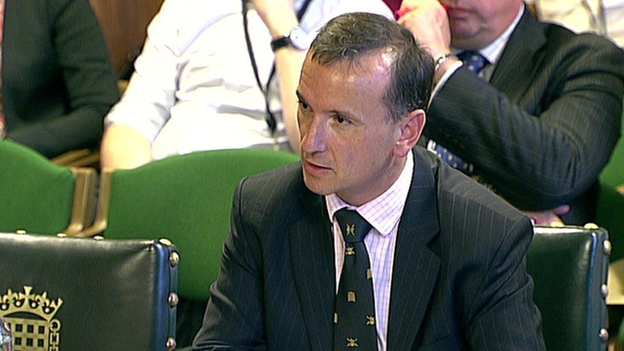Cairns on Brexit, the Wales Bill, funding and bridges
- Published
- comments

'Well, there are certainly lots of challenges' - Welsh Secretary Alun Cairns on the advantages of Brexit.
MPs on Parliament's Welsh affairs committee have been grilling Alun Cairns for the first time since his appointment in March.
The hour-long session featured questions on Brexit, steel, devolution and the Severn crossings.
Committee chair David Davies, who voted for Britain to leave the EU, opened with this question: "May I begin by asking what you think are the potential advantages to Wales of Brexit?"
Mr Cairns, who campaigned for Britain to remain, gave this hesitant reply: "Well there are certainly lots of challenges. The advantages are that we are almost forced to look elsewhere other than Europe and we need to remember we're not turning our backs on Europe, we're just merely leaving the European Union and nations across Europe will still remain friends and allies.
"The advantages are that we will need to focus our efforts on seeking new international trade opportunities and in developing relationships between Welsh business and Welsh stakeholders with those new markets. There are of course a whole series of other issues and challenges that will remain."
'Stakeholder'
He did concede there could be short-term "additional marketing opportunities" for tourism from the fall in the value of the pound. Mr Cairns said he had been holding some "stakeholder engagements" to discuss the impact of Brexit
Questioned about devolution, he said there are no changes planned to the Wales Bill other than those he has previously signalled at committee stage.
Plaid Cymru's Liz Saville Roberts complained that the Bill was going through Parliament so quickly it was difficult to scrutinise properly. Mr Cairns said every debate had finished with time to spare.
Asked about the dropping of the commitment to hold a referendum before Wales gets income tax powers, he told the MPs: "Tax is an absolutely essential part of devolution policy." He added: This is about mature, accountable devolution."
He said he intended to have a fiscal framework agreed with the Welsh Government before the Wales Bill becomes law.
Asked about funding, he said: "There are no plans to change the Barnett Formula." He said the funding floor introduced by the government meant funding per head was set at around 115 % of the English average.
On the steel industry, Aberavon MP Stephen Kinnock said that there were some concerns about the possible joint venture of ThyssenKrupp and Tata Steel Europe. Mr Cairns said: "ThyssenKrupp are prepared to invest significant sums of money into a joint venture scheme with the offer of support from the UK government, and that in itself we can take encouragement from because that shows they're prepared to spend money."
He said taxpayers' money would only be used if there was a viable sustainable future in steelmaking.
It wouldn't be a Welsh affairs select committee without a question from David Davies on the Severn crossings. He was concerned that the government might try to make a profit out of them once they return to public ownership. Apparently, it won't.